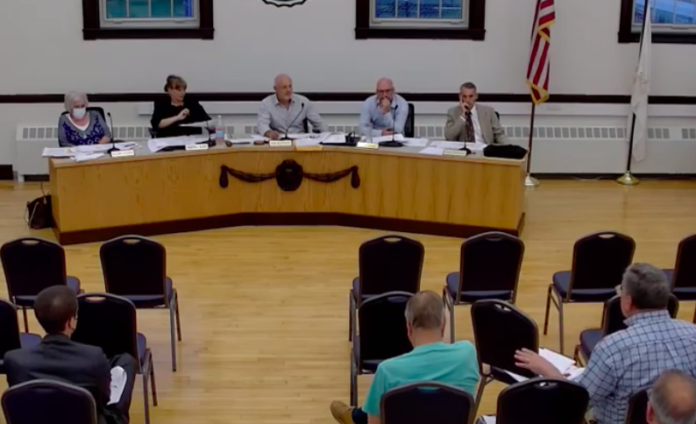NORTH SMITHFIELD – Amid national tragedies at schools and ongoing concerns regarding the lasting effects of the pandemic on students’ mental health, the town held a public hearing on a proposed budget for the upcoming fiscal year, where attention often turned to the issues of safety, and the need to keep kids engaged.
Town Administrator Paul Zwolenski has proposed a levy increase of 2.45 percent over the prior fiscal year, with accompanying tax rates expected to drop as a result of the town’s recent property revaluation. The full revaluation, completed in December, saw residential properties increase in value 22 percent on average, while commercial property values went up 7 percent.
An advertisement for the public hearing on the budget showed proposed rate decreases spread nearly equally between residential, commercial and tangible property – and was another cause for concern among some at the public hearing. The ad, published as part of an annual statutory requirement in the budget process, showed a tax rate decrease of 9.67 percent for residential property, and 9.64 percent for both commercial and tangible property.

Resident Michael Clifford has pointed out that decreasing the rates equally would put a greater portion of the tax burden on residential homeowners, who saw a far greater value increase. Tangible property is not subject to the recent revaluation process and has not changed in value, making it unclear why the draft budget plan would show a decrease in that tax category, he noted.
Finance Director Cynthia DeJesus responded that the rate changes published in the proposed budget ad were not reflective of what will happen once the document is finalized.
At the hearing, Clifford questioned if choosing arbitrary figures to advertise the meeting meets the intent of the state’s legal requirement.
“If I were a commercial property owner and I saw those rates advertised, I might decide not to come to this meeting because I’m looking at getting a reduction,” he said at the hearing, adding that he’s concerned the decision could create legal issues for the town.
Town Council President John Beauregard said he’s satisfied the town has met the legal requirement.
“My take on this is, the budget is not finalized,” Beauregard said.
Asked later if he would support reducing the tax on tangibles, Beauregard said he would have to look into the issue further.
It’s a decision his board will ultimately have to make on Monday, June 27, when the council goes through the draft budget line by line, weighing proposals and recommendations before taking a final vote on rates.
Also unclear is where councilors will land on the school department allocation. School officials have requested a 2.2 percent increase, with funding of $464,000 more than the town provided last year. Both the budget board and town administrator have proposed a more modest increase of .94 percent or $198,481, leading both the superintendent and members of the School Committee to advocate for the higher figure at hearings held over the past two weeks.
“Most of this is to cover obligated contractual raises that were appropriated by council,” said Supt. Michael St. Jean.
St. Jean said the department’s proposed budget decreases staff, eliminating one kindergarten teacher and one electrician, but more cuts are not feasible.
“We don’t want to pack in the kids to the maximum while we’re trying to recover from Covid,” he said.
School Committee Vice Chairperson Jean Meo disputed the idea that the allocation should be smaller due to a hike in state aid and recent federal grants aimed at pandemic recovery – known as Elementary and Secondary School Emergency Relief. Federal funding to the district, sent in three installments, is expected to total nearly $2.4 million.
“We are using ESSER funds to help our students make gains and succeed,” said Meo.
“Obviously, I must advocate for our students. We are working very hard to recover from Covid,” Meo said. “We’re an excellent school system. We spend our money wisely.”
“I know this is a difficult financial year for everyone, but can’t just shortchange our students,” she added.
Committee member Peg Votta pointed out that research shows that in order for students to get back what they lost during the pandemic, class sizes should be smaller.
Councilor Claire O’Hara said she’s concerned about addressing the students’ psychological needs.
“I’ve seen changes,” O’Hara said. “It scares me.”
“If they do not stay engaged we’re going to lose them completely,” O’Hara said of students. “This is not going to end overnight.”
St. Jean pointed to efforts to help students, including a series of free student enrichment programs running over the summer. He noted ESSER funds were also used to hire two student support counselors and a board certified behavioral analyst.
“We will be there to meet their needs,” St. Jean said. “Fortunately, through federal funding, we have the means to meet the need.”
School Committee Chairman James Lombardi said that he’s been an advocate for increased mental health services and counseling.
“I have seen it first hand that these kids are suffering,” Lombardi said. “I think that should be our number one priority right now. The pandemic hurt us more than we will ever know – and it will continue to hurt us.”
Councilor Stephen Corriveau asked St. Jean is the school department has created a plan for maintenance of the high school’s recently refurbished turf field.
“We’re on the verge of announcing something really big and it’s going to make everybody really happy,” St. Jean responded. “That’s all I can say about that. Just give us a little more time.”
Resident Mike Rapko questioned the district’s current effort to expand athletic offerings by installing throwing facilities, an upgrade underway thanks to a school surplus from previous budget years.
“It’s not a question of not doing it,” Rapko said. “It’s a question of when do you do it.”
Councilor Paul Vadnais pointed out that there are laws governing how the district can spend such funds.
“They cannot give it back to the town,” Vadenais said of the surplus.
School security and student mental health was also a focus during discussion of police department funding, after Police Chief Tim Lafferty pointed out the department is short-staffed because two members are serving as school resource officers.
“We don’t need two, we need three,” said O’Hara. “Because of the times, we have to provide you with what you need. When it comes to the safety of our children and staff, or the people in our town, we have to be on top of it.”
“She’s right. You need three,” Beauregard said.
Lafferty said he’d be open to adding an SRO at the elementary school, but that the officer should not be taken from his rank and file staff.
“It’s not all about guns,” Lafferty said. “It’s about communication and intervention. Rest assured, I think the town is in a really good spot.”
Lafferty advocated for items he hopes will be approved in the final budget, including staff increases, and a cruiser and new electronic sign requested as part of the capital budget. The staffing issue, he said, has led to increased expenses for overtime.
Fire Chief David Chartier also pointed to staffing shortages, noting that the need to depend on mutual aid from neighboring communities is a growing problem for North Smithfield Fire & Rescue.
“This is an ongoing issue. It’s not going away,” Chartier said. “I would really like you to contemplate this seriously.”
Chartier also argued in favor of a replacement generator requested in the capital budget, noting the one used at station one is 25 years old. The chief noted that it will take 12-14 months to receive a replacement, and a breakdown of the old generator would cause major problems in a power outage.
“We will not be able to answer phone calls,” Chartier said. “We will not be able to open doors to get vehicles out.”
Councilors closed the public hearing Tuesday, June 21. stating that no additional public comment will be taken when they meet to vote on the budget June 27.









When did Mr Beauregard become a lawyer and a CPA. Mr. Beauregard has no concern for taxpayers. Also more spending to catch up students from COVID is absurd. Union teachers failed to teach during distant learning so now they need to make up for the lake of teaching by increasing instruction time. Reducing class sizes does not work and has not increased test scores. Just look at how bad before Covid NS performed. If we are so concerned with education then why did we waste over $1 million on a football field. School department spending is out of control. The school committee should study management cases, all cases determined that additional spending has minimal effect on education and test scores.
Beauregard, Zwolenski and most of the council have an agenda and keeping tax rates low for homeoners is the last thing they are concerned with. As long as they are in offfice our taxes will continue to rise and they will spend, spend, spend!!! Many of us could see this coming during the last year and now with pet projects for all this town will be too costly to enjoy any quality of life. And as far as Beauregard’s table manners go, he has a lot to work on….
100% correct. Mr. Beauregard is just another example of a bully police officer. Remember respect is earned not granted or elected.
Since the Town budgets close to $200,000 a year for legal services, why is Mr. Beauregard reluctant to ask for and share the Town Solicitor’s written legal opinion about the legality of the ad? Why are relying on his “take on this” issue”? My fear is that homeowners might end up paying a greater portion of taxes than they should have to pay. Lowering the tangible tax rate may give a big break to commercial solar array owners who build a battery storage facility.